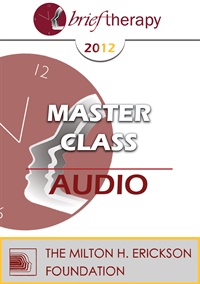
- Average Rating:
- Not yet rated
- Topic Areas:
- Master Classes | Brief Therapy | Experiential Therapy | Gestalt | Hypnosis | Hypnotherapy | Psychotherapy | Ericksonian Hypnosis and Therapy Techniques
- Categories:
- Brief Therapy Conference | Brief Therapy Conference 2012
- Faculty:
- Jeffrey Zeig, PhD | Erving Polster, PhD
- Duration:
- 2:44:44
- Format:
- Audio Only
- Original Program Date:
- Dec 10, 2012
- Short Description:
- Gestalt therapy and Ericksonian hypnotherapy are experiential methods of change. In combination they can be synergistic. Psychotherapy is best when clients have first-hand experience of an alive therapeutic process. Such dynamic empowering experiences pave the way for dynamic understandings. Drs. Polster and Zeig will engage with each other and participants to examine commonalities and differences in their work in this engaging all-day workshop.
- Price:
- $15.00 - Base Price
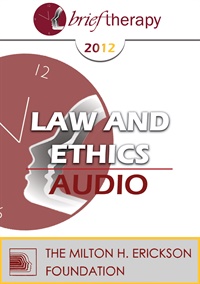
- Average Rating:
- Not yet rated
- Topic Areas:
- Master Classes | Brief Therapy | Experiential Therapy | Gestalt | Hypnosis | Ericksonian Hypnosis and Therapy Techniques | Hypnotherapy | Psychotherapy
- Categories:
- Brief Therapy Conference | Brief Therapy Conference 2012
- Faculty:
- Jeffrey Zeig, PhD | Erving Polster, PhD
- Duration:
- 2:40:44
- Format:
- Audio Only
- Original Program Date:
- Dec 10, 2012
- Short Description:
- Gestalt therapy and Ericksonian hypnotherapy are experiential methods of change. In combination they can be synergistic. Psychotherapy is best when clients have first-hand experience of an alive therapeutic process. Such dynamic empowering experiences pave the way for dynamic understandings. Drs. Polster and Zeig will engage with each other and participants to examine commonalities and differences in their work in this engaging all-day workshop.
- Price:
- $15.00 - Base Price
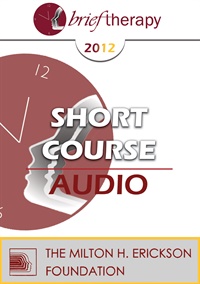
- Average Rating:
- Not yet rated
- Topic Areas:
- Short Courses
- Categories:
- Brief Therapy Conference | Brief Therapy Conference 2012
- Faculty:
- Christine Guilloux, DESS Psychology
- Duration:
- 21:11
- Format:
- Audio Only
- Original Program Date:
- Dec 09, 2012
- Short Description:
- BT12 Short Course 29 – Everlasting Heroes – Christine Guilloux, DESS Subject, patient, client, therapist, teacher, trainer, supervisor, supervised, all of us are shaped from an essence, the stuff we are made of, the hero within. This workshop will offer then ways to utilize our ever lasting heroes, our models in our therapeutic goals for inner change and help the patient build from the hero within himself/herself.
- Price:
- $15.00 - Base Price
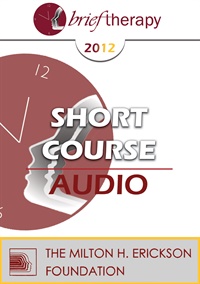
- Average Rating:
- Not yet rated
- Topic Areas:
- Trance | Trauma | Short Courses | Mindfulness | Hypnosis
- Categories:
- Brief Therapy Conference | Brief Therapy Conference 2012
- Faculty:
- Ronald Alexander, PhD
- Duration:
- 1:29:32
- Format:
- Audio Only
- Original Program Date:
- Dec 09, 2012
- Short Description:
- BT12 Short Course 30 – Mindfulness, Trauma, and Trance: Ericksonian Brief Solutions: A Mind/Body Approach – Ronald Alexander, PhD This course will address the rapid treatment of trauma by utilizing both Mindfulness practice and Ericksonian orientation. The course will highlight Milton Erickson’s use of storytelling, metaphor and rapid trance induction as well as the use of mindfulness practice for framing, re-framing and de-framing the immediate reorganization of transforming somatic-affective experience into new healing rhythms in the body. These methods allow the body to open healthier pathways for new somatic recoveries. We will also emphasize the use of naturalistic hypnotic trance, guided mindfulness practice, and healing metaphors for generating new therapeutic skills in mindbody healing therapies.
- Price:
- $15.00 - Base Price
Tags: Mind-Body Mindfulness
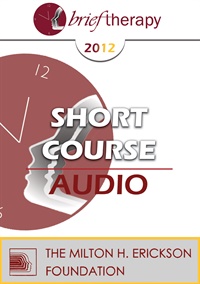
- Average Rating:
- Not yet rated
- Topic Areas:
- Short Courses | Brief Therapy | Research
- Categories:
- Brief Therapy Conference | Brief Therapy Conference 2012
- Faculty:
- Eva Long
- Duration:
- 1:18:46
- Format:
- Audio Only
- Original Program Date:
- Dec 09, 2012
- Short Description:
- BT12 Short Course 31 – Sustaining Passion and Longevity in Life Using Medical and Longevity Research and Theories in Brief Therapy – Eva Long, PhD This is a fast-paced, proven successful workshop on how professionals will help patients and clients utilizing the current adult development research/best practices in meaningful work/self-renewal with practical implementation ideas. This session will focus on the importance of 1) creating a life’s purpose, 2) optimism, 3) a circle of friends, 4) managing loss, and letting go while connecting the dots on some of the most significant medical and longevity research.
- Price:
- $15.00 - Base Price
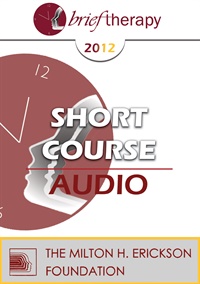
- Average Rating:
- Not yet rated
- Topic Areas:
- Short Courses | Brief Therapy | Subliminal Therapy | Unconscious Processes
- Categories:
- Brief Therapy Conference | Brief Therapy Conference 2012
- Faculty:
- Edwin Yager, PhD
- Duration:
- 1:23:45
- Format:
- Audio Only
- Original Program Date:
- Dec 09, 2012
- Short Description:
- Subliminal Therapy is an innovative and easily-learned, psychodynamic technique for use in clinical settings. The theory, rationale and application are presented in this workshop, including compelling data on efficacy as derived from patient-completed, pre- and post-treatment inventories. The workshop addresses application of ST to both psychological and psychogenic medical problems.
- Price:
- $15.00 - Base Price
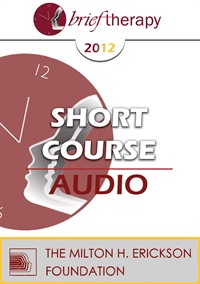
- Average Rating:
- Not yet rated
- Topic Areas:
- Short Courses | Brief Therapy | Reality Therapy | Solution Oriented Approach
- Categories:
- Brief Therapy Conference | Brief Therapy Conference 2012
- Faculty:
- Robert Wubbolding, EdD
- Duration:
- 1:28:30
- Format:
- Audio Only
- Original Program Date:
- Dec 09, 2012
- Short Description:
- BT12 Short Course 33 – Brief Reality Therapy: Present, Accountable, and Solution-Focused – Robert Wubbolding, EdD Simulated role-play demonstrations, the focus of this session, illustrate the practical use of the WDEP system of reality therapy. Client self-evaluation, the core of reality therapy, as well as the incorporation of several Ericksonian principles such as utilization, are highlighted. Participants will gain information about research studies validating the use of reality therapy as well as practical and innovative ideas immediately useful on the job. Handouts suitable for photocopying will be provided.
- Price:
- $15.00 - Base Price
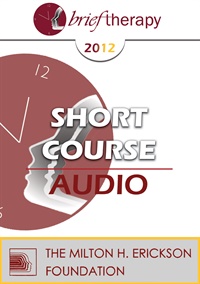
- Average Rating:
- Not yet rated
- Topic Areas:
- Hypnotherapy | Children and Adolescent Therapy | Short Courses
- Categories:
- Brief Therapy Conference | Brief Therapy Conference 2012
- Faculty:
- Tobi Goldfus, LCSW
- Duration:
- 1:18:00
- Format:
- Audio Only
- Original Program Date:
- Dec 09, 2012
- Short Description:
- BT12 Short Course 34 – Unplugging from the Outside in: Brief Strategic Hypnotherapy with Older Adolescents and Young Adults (Ages 16-25) – Tobi Goldfus, LCSW-C BCD With a plugged-in 24/7 cyberspace that demands and creates instantaneous response to internet and social networking, many young people have difficulty understanding self-regulation and present a lack of selfawareness and modulation. This workshop proposes a tailored strategic approach toward utilizing the natural creativity and novelty that young people have embedded in their development make-up but often have limited access toward using their inner resources. Experiential and specific ways to elicit responsiveness and enhance “down regulation” will be explored.
- Price:
- $15.00 - Base Price
Tags: Adolescents Children Hypnotherapy
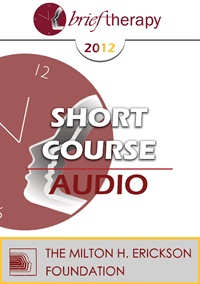
- Average Rating:
- Not yet rated
- Topic Areas:
- Couples Therapy | Short Courses
- Categories:
- Brief Therapy Conference | Brief Therapy Conference 2012
- Faculty:
- Birgitta Gregory, PhD | Bruce Gregory, PhD
- Duration:
- 1:28:56
- Format:
- Audio Only
- Original Program Date:
- Dec 09, 2012
- Short Description:
- BT12 Short Course 35 – An Integrative and Creative Approach Working with Couples Achieving Lasting Solutions – Bruce Gregory, PhD and Birgitta Gregory, PhD This short course will focus on the treatment of couples from the perspectives of symptoms, rigid, dysfunctional behavior patterns, and narcissistic defenses. An integrative approach utilizing creativity and humor will be presented, incorporating CBT, psychodynamic, Ericksonian, Jungian and existential perspectives. Validation, sequencing, containment and questions that facilitate accountability will be highlighted in the context of empowering clients on a variety of levels.
- Price:
- $15.00 - Base Price
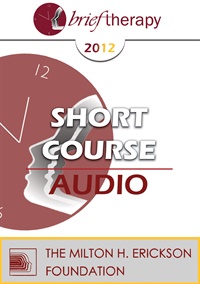
- Average Rating:
- Not yet rated
- Topic Areas:
- Short Courses | Borderline | Brief Therapy
- Categories:
- Brief Therapy Conference | Brief Therapy Conference 2012
- Faculty:
- John Lentz, D. Min.
- Duration:
- 1:29:05
- Format:
- Audio Only
- Original Program Date:
- Dec 09, 2012
- Short Description:
- BT12 Short Course 36 – New Perspectives and Healing for Borderlines: A Brief Therapy Intervention for Lasting Change – John Lentz, DMin This radical new approach for Borderline Personality Disorder utilizes strength based approaches that work, are respectful and brief. Combining clinical practice, communication theory and hypnotic principles this approach helps Borderlines feel safe and respected, while they change. Utilizing Borderline intuition, and insight it offers a way for them to gently alter their interpretations so that they can relate effectively and safely. You will like your new skills. This workshop comes from the author’s newest book.
- Price:
- $15.00 - Base Price
Tags: Borderline
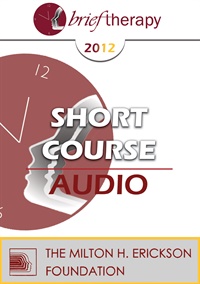
- Average Rating:
- Not yet rated
- Topic Areas:
- Animal Assisted Therapy | Psychotherapy | Short Courses | Metaphors | Brief Therapy
- Categories:
- Brief Therapy Conference | Brief Therapy Conference 2012
- Faculty:
- Dale Klein-Kennedy, LPCC | Karen Wall
- Duration:
- 1:07:50
- Format:
- Audio Only
- Original Program Date:
- Dec 09, 2012
- Short Description:
- Animal metaphors are used as a part of our everyday vocabulary describing relationships, personal characteristics, etc. Metaphor in the presence of the work with the animal takes on a new and deeper meaning. This presentation will demonstrate the powerful use of animals and animal metaphors in brief psychotherapy. Through examples and discussion of the work, attendees will develop an understanding of ATT (animal-assisted therapy) and will participate in a live demonstration of AAT.
- Price:
- $15.00 - Base Price
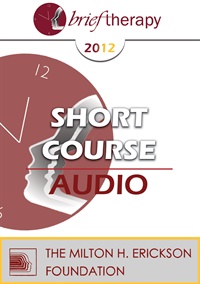
- Average Rating:
- Not yet rated
- Topic Areas:
- Short Courses | Multicultural | Therapist Development
- Categories:
- Brief Therapy Conference | Brief Therapy Conference 2012
- Faculty:
- Bob Bertolino, PhD
- Duration:
- 1:26:07
- Format:
- Audio Only
- Original Program Date:
- Dec 09, 2012
- Short Description:
- Some agencies consistently achieve better clinical outcomes. The benefits of higher-performing agencies include greater accountability, improved resource management, briefer treatment duration, decreased client dropout, and increased staff retention. Participants in this workshop will first learn about key research findings that form the building blocks of sustainable “cultures of excellence.” Next, specific strategies including brief and time -sensitive interventions, client feedback, and monitoring of individual and program outcomes will be described.
- Price:
- $15.00 - Base Price
Tags: Therapist Development
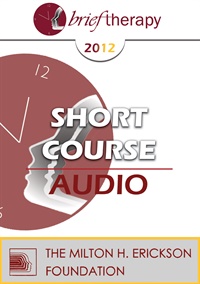
- Average Rating:
- Not yet rated
- Topic Areas:
- Short Courses
- Categories:
- Brief Therapy Conference | Brief Therapy Conference 2012
- Faculty:
- Deborah Beckman
- Duration:
- 1:31:07
- Format:
- Audio Only
- Original Program Date:
- Dec 09, 2012
- Short Description:
- BT12 Short Course 39 – Nightly Napping is Not Enough – Deborah Beckman, MS Late night commercials promise to recapture a full night’s sleep. Still, we’re chronically sleep deprived, catching little more than midnight naps. Chasing “whys” distracts and delays reestablishing healthy sleep. Rebuilding the how-to’s of healthy sleep is crucial to reestablishing resilience. This protocol goes beyond good sleep hygiene and gadgets by prioritizing the physiology of sleep with components of clients’ presenting complaint(s). Clinical demonstration, case applications and discussion provide opportunities to develop specific interventions.
- Price:
- $15.00 - Base Price
Tags: Insomnia
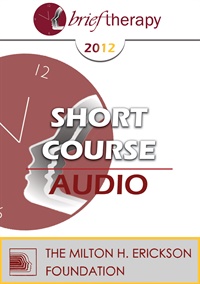
- Average Rating:
- Not yet rated
- Topic Areas:
- Psychotherapy | Children and Adolescent Therapy | Short Courses
- Categories:
- Brief Therapy Conference | Brief Therapy Conference 2012
- Faculty:
- Maria Escalante de Smith, MA
- Duration:
- 1:14:40
- Format:
- Audio Only
- Original Program Date:
- Dec 09, 2012
- Short Description:
- BT12 Short Course 40 – Brief Psychotherapy for Children and Adolescents Facing Serious Situations – Maria Escalante de Smith, MA When children and teenagers face serious problems they experience a variety of feelings and emotions. Brief Therapy techniques can help them find solutions and explore new alternatives within a short time. Short interventions, such as brief trances and conversational hypnosis will be demonstrated. Utilization of individual’s resources, likes, and favorite activities will also be discussed as brief therapy tools will be used during therapy. Participants will be able to explore how other approaches such as Narrative Therapy can enhance and embellish Ericksonian approaches.
- Price:
- $15.00 - Base Price
Tags: Children Psychotherapy Adolescents
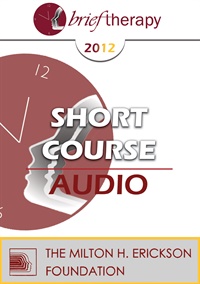
- Average Rating:
- Not yet rated
- Topic Areas:
- Short Courses | Communication | Multicultural
- Categories:
- Brief Therapy Conference | Brief Therapy Conference 2012
- Faculty:
- Sherri Reynolds
- Duration:
- 1:34:45
- Format:
- Audio Only
- Original Program Date:
- Dec 09, 2012
- Short Description:
- BT12 Short Course 41 – How Culture Impacts Communication – Sherri Reynolds, MA, MFT Participants will identify and analyze culture using 10 dimensions to break through communication barriers. Participants will learn to assess their own and their clients’ cultural styles of communication. Participants will also learn to apply specific techniques to facilitate more effective communication with clients, allowing them to establish lasting trust and develop a deeper relationship with clients from diverse cultures.
- Price:
- $15.00 - Base Price
Tags: Multi-Cultural
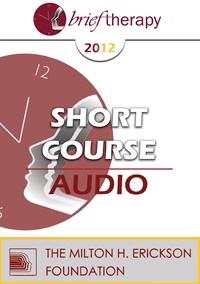
- Average Rating:
- Not yet rated
- Topic Areas:
- Hypnotherapy | Emotionally Focused Therapy (EFT) | Short Courses | Pain and Healing
- Categories:
- Brief Therapy Conference | Brief Therapy Conference 2012
- Faculty:
- Jeffrey Feldman, PhD
- Duration:
- 1:16:24
- Format:
- Audio Only
- Original Program Date:
- Dec 09, 2012
- Short Description:
- BT12 Short Course 42 – Emotion- Focused Hypnotherapy for Coping with Pain – Jeffrey Feldman, PhD This short course will introduce a treatment approach that targets the affective dimension of pain. The emotion specific wording and elicitation of positive state dependent learning can be used in a brief therapy approach whether or not patients’ feelings of anger, sadness, or anxiety are associated with physical pain.
- Price:
- $15.00 - Base Price
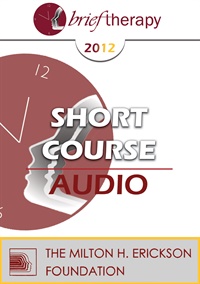
- Average Rating:
- Not yet rated
- Topic Areas:
- Short Courses
- Categories:
- Brief Therapy Conference | Brief Therapy Conference 2012
- Faculty:
- Joseph Dowling, MS, LPC
- Duration:
- 55:17
- Format:
- Audio Only
- Original Program Date:
- Dec 09, 2012
- Short Description:
- BT12 Short Course 43 – How to Become Smart Enough to Know When to Stop Thinking: A Brief Ericksonian Approach to Lasting Solutions – Joseph Dowling MS, LPC Milton H. Erickson, MD, understood that “the conscious (thinking) mind doesn’t do much of anything of much significance…while the unconscious mind is an infinite storehouse of dreams, potentials, and solutions…” This workshop will teach a brief, solution-focused, strategic, and hypnotic approach to anxiety-related disorders. Intellectualizing, analyzing, self-criticizing, WHY-ing and WHAT-IF-ing clients will be targeted as participants learn to employ Ericksonian interventions including solution-focused questions, strategic task assignments, and formal/ conversational hypnosis via live demonstration, experiential exercise, and case studies.
- Price:
- $15.00 - Base Price
Tags: Unconscious Processes
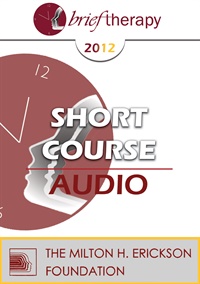
- Average Rating:
- Not yet rated
- Topic Areas:
- Hypnosis | Short Courses | Metaphors | Brief Therapy
- Categories:
- Brief Therapy Conference | Brief Therapy Conference 2012
- Faculty:
- Bette Freedson, MSW
- Duration:
- 1:14:37
- Format:
- Audio Only
- Original Program Date:
- Dec 09, 2012
- Short Description:
- Therapists working with single mothers often hear stories of abandonment, disempowerment, loneliness, hopelessness, victimization, rage and unrelenting stress. Disturbing perceptions and emotions such as these, and the distorted interpretations that result, may rigidify into psychic schemas comprised of patterns of dysfunctional reacting and compromised coping. Identifying negative schemas, and harnessing the mind’s powerful potential to transform them, will be the dual focus of this course. Participants will explore the way in which the quiet mind, combined with the evocative and rhythmic language of hypnosis, can fuel a subconscious shift from confusion to clarity. Participants will experience the way in which sympathetic identification with transformed metaphors, drawn from the substance of personal stories, can fuel an alchemical shift that decreases stress, increases ego strength, and paves the way to inner peace.
- Price:
- $15.00 - Base Price
Tags: Hypnosis Brief Therapy Metaphors

- Average Rating:
- Not yet rated
- Topic Areas:
- Short Courses
- Categories:
- Brief Therapy Conference | Brief Therapy Conference 2012
- Faculty:
- Dale Bertram, PhD | Mike Rankin, MA
- Duration:
- 1:23:09
- Format:
- Audio Only
- Original Program Date:
- Dec 09, 2012
- Short Description:
- BT12 Short Course 45 – Ericksonian Principles for Helping Stepfamilies Blend – Dale Bertram, PhD and Michael Rankin, MA, LMFT By using Ericksonian Methods of utilizing resistance, working with dissociation, and altering its consciousness, we can help a step-family to change its trance and the family can become a true blended family. Step-families can learn to play together, work together, and support one another.
- Price:
- $15.00 - Base Price
Tags: Consciousness Trance
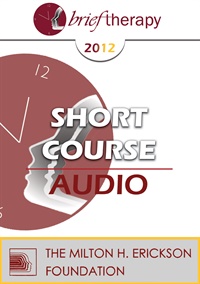
- Average Rating:
- Not yet rated
- Topic Areas:
- Short Courses
- Categories:
- Brief Therapy Conference | Brief Therapy Conference 2012
- Faculty:
- Lindasue Marshall, LCSW
- Duration:
- 1:21:56
- Format:
- Audio Only
- Original Program Date:
- Dec 09, 2012
- Short Description:
- BT12 Short Course 46 – Brief Therapy for the Final Stages of Life – Lindasue Marshall, MSW Brief therapy principals and methods that assess how the patient sees the problem, their beliefs and values about life and death, then intervene with tasks, reframing, and metaphor can provide rapid lasting transformation for patients with terminal illness. The therapist’s ability to help deal both directly and indirectly with the last stages of life can help terminal patients move from a fear based position to live meaningful final chapters of their lives.
- Price:
- $15.00 - Base Price
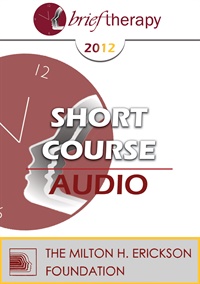
- Average Rating:
- Not yet rated
- Topic Areas:
- Trance | Neuroscience | Psychotherapy | Short Courses
- Categories:
- Brief Therapy Conference | Brief Therapy Conference 2012
- Faculty:
- Susan Pinco, PhD
- Duration:
- 1:13:42
- Format:
- Audio Only
- Original Program Date:
- Dec 09, 2012
- Short Description:
- BT12 Short Course 47 – Is it the Talking that Cures? An Exploration of the Role of Silence and Words in the Clinical Encounter – Susan Pinco, PhD Explore the role that silence plays in the hypnotic and clinical process. Our journey will begin with a discussion of structured and unstructured silence, how both are manifested, and potentially utilized. It continues with an overview of research related to silence in psychotherapy as well as findings in neuroscience that help explain why silence is a key ingredient in effective trance-formational processes. Attendees will engage in exercises that are designed to expand their awareness of the pivotal role that silence plays in healing and in so doing facilitate the conscious development of strategic interventions that utilize silence hypnotically to address a wide range of clinical issues.
- Price:
- $15.00 - Base Price
Tags: Neuroscience Psychotherapy Trance
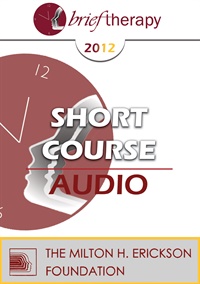
- Average Rating:
- Not yet rated
- Topic Areas:
- Psychology | Short Courses
- Categories:
- Brief Therapy Conference | Brief Therapy Conference 2012
- Faculty:
- Fabio Leonardi | Gerry Grassi
- Duration:
- 1:05:15
- Format:
- Audio Only
- Original Program Date:
- Dec 09, 2012
- Short Description:
- BT12 Short Course 48 – Changing Individual Systems in Order to Obtain Lasting Solutions: Three Brief Strategic Techniques – Fabio Leonardi, Psychology, and Gerry Grassi, Psychology Lasting solutions imply a second order change, which is a change of one’s own identity system. Basing on strategic- constructivist tradition, we developed three techniques. The first one aims to re-frame identity systems characterized by feelings of inadequacy and social inhibition. The second one aims to change identity systems characterized by feelings of victimization. The third one is used with subjects who feels dependent on others.
- Price:
- $15.00 - Base Price
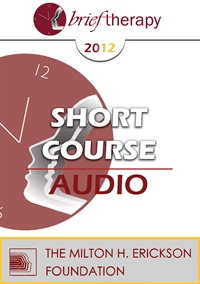
- Average Rating:
- Not yet rated
- Topic Areas:
- Psychotherapy | Short Courses
- Categories:
- Brief Therapy Conference | Brief Therapy Conference 2012
- Faculty:
- Roxanna Erickson Klein, RN, PhD, LPC, LCDC | Pennie Johnson
- Duration:
- 1:42:53
- Format:
- Audio Only
- Original Program Date:
- Dec 09, 2012
- Short Description:
- BT12 Short Course 49 – Milton Erickson and Patrick Carnes: Comparing and Contrasting the Work of Two Leaders – Roxanna Erickson-Klein, PhD, and Pennie Johnson, MA This course will look at the work of two charismatic leaders, each of who made a substantial impact to psychotherapy practiced today. Commonalities and differences will be explored, and the relevance of their work will be discussed. Ideology, strategies, and principles of treatment will be compared and contrasted.
- Price:
- $15.00 - Base Price
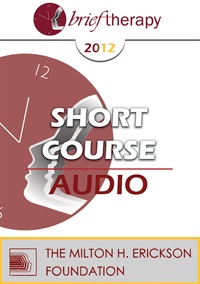
- Average Rating:
- Not yet rated
- Topic Areas:
- Short Courses
- Categories:
- Brief Therapy Conference | Brief Therapy Conference 2012
- Faculty:
- Cheryl Bell-Gadsby, M.A., R.C.C. | Kathleen Donaghy
- Duration:
- 1:54:04
- Format:
- Audio Only
- Original Program Date:
- Dec 09, 2012
- Short Description:
- BT12 Short Course 50 – Pattern Disruption Right Out of the Gate – Cheryl Bell-Gadsby, MA, RCC, and Kathleen Donaghy, PhD, PC This session will demonstrate the efficient and strategic use of energy and trancework in shifting clients’’ resistance into movement and resolution of conflict. Case examples will be provided to illustrate application of our approach with a couple, a mother and daughter, and with adolescent girls. We will conclude with a demonstration and discussion.
- Price:
- $15.00 - Base Price
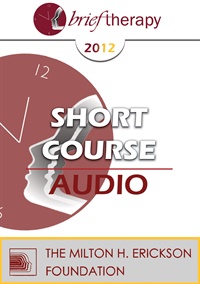
- Average Rating:
- Not yet rated
- Topic Areas:
- Anxiety | Depression | Short Courses | Communication | Neurobiology
- Categories:
- Brief Therapy Conference | Brief Therapy Conference 2012
- Faculty:
- Bart Walsh, MSW
- Duration:
- 1:55:20
- Format:
- Audio Only
- Original Program Date:
- Dec 09, 2012
- Short Description:
- BT12 Short Course 51 – Effective Management of Chronic Anxiety and Depression with Essential Neurobiological Communication – Bart Walsh, MSW Learn how to access deep levels of mind-body functioning for remission of chronic anxiety and depression. Essential neurobiological communication (ENBC) incorporates a form of body language known as ideomotor signaling. Affected individuals learn to fully manage these chronic conditions. Resolve past emotion using a noninvasive protocol integrating a progressive ratification sequence for grounding emotional adjustments in thought, perception and behavior.
- Price:
- $15.00 - Base Price
Tags: Anxiety Depression

